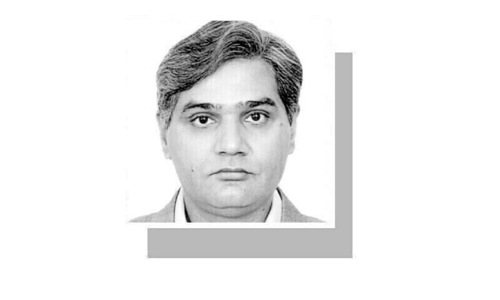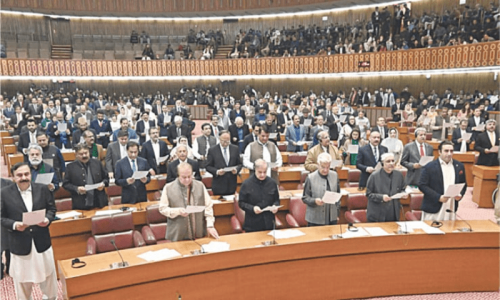A NUMBER of senior Muttahida Qaumi Movement (MQM) leaders have died of violent causes in a city which in the last two decades has seen frequent bouts of bloodshed.
Whether or not these assassinations were carried out by outside agencies, the violence at the heart of the party cannot be ignored. So when Altaf Hussain issued a barely-veiled threat to Pakistan Tehreek-i-Insaf supporters protesting the conduct of the elections in Karachi, his words were taken seriously.
And when Zahra Shahid was gunned down by an unknown killer the day before the re-polling in certain areas of Karachi’s NA-250 constituency, many voters decided to stay at home. This understandable fear plus the boycott by the MQM and some other parties resulted in the low turnout of 10pc.
But the low turnout and suspicions of rigging in a handful of constituencies should not detract from a largely free and fair election.
According to neutral observers, the May 11 polls were the cleanest we have had in many years. Zardari’s accusations of massive rigging by the bureaucracy and the ‘foreign hand’ in Punjab should be dismissed with the contempt they deserve.
While the results have transformed the political landscape, in Sindh the status quo remains largely unchanged. With the PPP sweeping the rural areas and the MQM dominant in the major cities, the two parties seem set to form another coalition government, minus the Awami National Party (ANP).
So while the PML-N will rule the federation and Punjab, the other provinces will be governed by parties that have little national presence. And now that many of the centre’s powers have been hived off to the provinces, Islamabad’s ability to help or hinder the federating units is much circumscribed.
Another big difference is that Nawaz Sharif does not need any coalition partners, and this will make a bigger difference to the MQM than to the PPP. At the height of the anti-Musharraf agitation in 2007, I asked a senior MQM member why they were sticking with the dictator. His answer was very revealing: “We need to have powerful friends in Islamabad.”
But the PML-N is no friend of the MQM’s. The fraught history of relations between the two parties is full of antagonism and mistrust. In the early days of Musharraf’s government, the MQM was invited to join the cabinet. When I asked Tariq Aziz, Musharraf’s principal civilian advisor, why he had helped induct this party into the government, he was pretty blunt: “We know the MQM has a stranglehold on Karachi, so we would rather have them with us than have them closing down the city every few days.”
This brings us to the source of the MQM’s power: the party that can shut down a city controls it. Despite its steady decline over the last three decades, Karachi remains Pakistan’s jugular vein. Each time the MQM announces one of its frequent days of protest or mourning, billions are lost.
So it’s not the number of seats it wins in the national and provincial assemblies, but the effectiveness of its muscle power to bring Karachi to a standstill that gives the party its clout.
And while the PML-N can distance itself from the MQM, the PPP has come to terms with the reality of the ethnic party. Whatever its nationalist elements might feel, the leadership realises that both Sindhis and Mohajirs have to share the province.
Another factor driving the need to cooperate is the steady influx of the Taliban into Karachi. These religious extremists threaten to displace the ANP as the representatives of the huge Pakhtun community in the metropolis. Thus far, the government has proved ineffective in confronting them, and it appears that only the MQM has the manpower and firepower to take them on.
But as recent events have shown, the MQM is not the monolithic entity it once was. Apart from the recent erosion of its once-solid vote bank, there are signs of cracks in its discipline. Its leader’s bizarre statements from London reveal a person increasingly out of touch with reality.
These last five years while the MQM was a coalition member in both Islamabad and Karachi, it often acted as though it was in the opposition.
Instead of sharing the blame, it was critical of decisions it had been party to. Thus it had the best of both worlds. Even when the coalition partners quarrelled bitterly over the local councils, for instance, and the MQM conveniently quit the coalition just before the elections, its governor has continued to hang on in office.
And while it could exploit the PPP’s weakness and its lack of a parliamentary majority in the National Assembly, its bargaining power is much reduced now.
But it is threatened on a more fundamental level by demographics: while the numbers of the Mohajir community in urban Sindh grow by natural reproduction, the ranks of Sindhis and Pakhtuns swell through migration as well. Each time there are floods in Sindh or army operations in the tribal areas, the number of non-Mohajirs in Karachi grows.
Given these factors, the coming years do not hold out much promise for peace and prosperity in Karachi. Nawaz Sharif will be happy to see the MQM and the PPP self-destruct over the next five years.
Tailpiece: I was pained and shocked at Zahra Shahid’s murder. She was a friend for years, and although we didn’t meet as often as I would have wished, I greatly admired her courage and activism. She urged me to travel to Balochistan and visit an educational project she was involved with. Sadly, the trip never materialised, and now probably never will.
irfan.husain@gmail.com














































